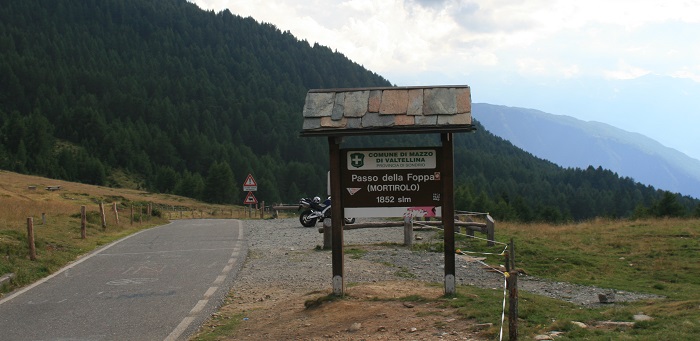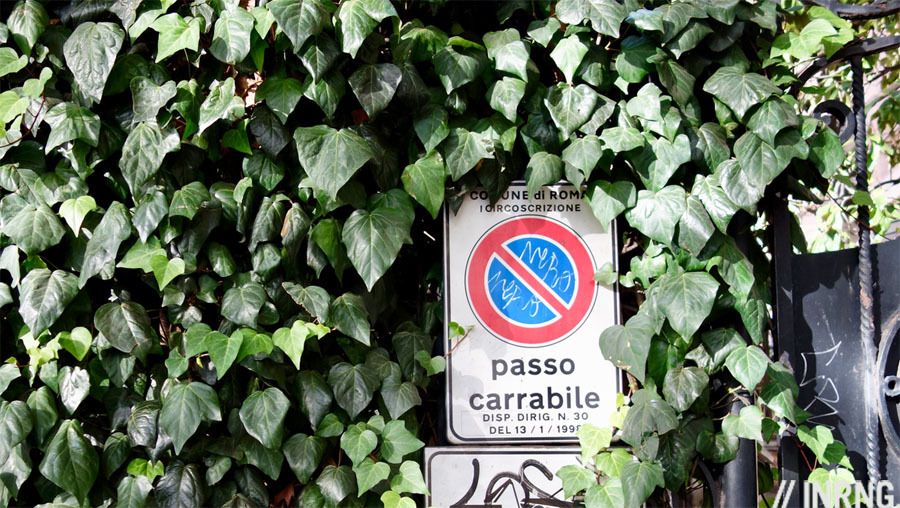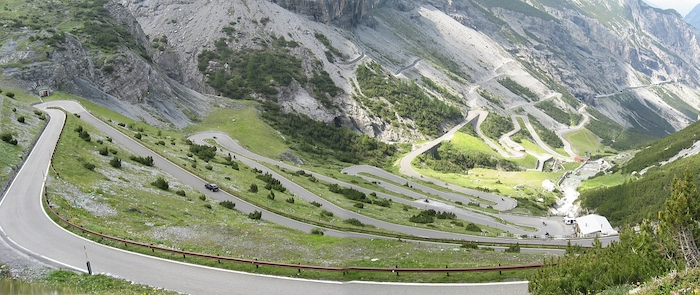The Giro continues its foray in to the Alps and tackles the Colle San Carlo today, literally the “Saint Charles Pass”. But isn’t passo the word for a mountain pass in Italy? Yes, it’s the standard terms however Italy, probably more than any other country, has many words for a mountain pass. In English “pass” is widespread, maybe there’s a “gap” here or a “saddle” there, but there are few synonyms. Italy has so many we can go from A-Z and the names often tell a story.
Passo is the standard Italian word and shouldn’t need much translation to English. It’s a term found all over Italy, from the Alps to Sicily, albeit with only a handful of passi in Sicily. There are 7,636 mountain passes in Italy at the last count, of which 1,060 are paved roads but the labels vary enormously, there’s an A-Z of terms.
You have accesso which suggests access across a mountain range, there’s bassa meaning a low point and a reminder a pass is not the “summit finish” conceit that cycling deploys, but the lowest way over a mountain. Bocca, meaning mouth, comes up a often and since Italy is big on dialects you’ll find passes with derivations like Bocche, Buca, Buche, Bochet and more. There’s Breccia, a breach in the mountains and similar to the brèche used in French and the English breach, to break through. If you know the Lombardia race route which is being borrowed in Sunday’s Giro stage then you’ll remember the Colma di Surmano which is derived from the Latin culmen, the culminating point of a hill or mountain.

The Mortirolo is a feared climb of the Giro and features next week and it’s known locally as the Passo della Foppa which is two labels in one as you know passo, but foppa is derived from the Latin fovea and means a cutting in the rock, a passage through the mountain.
In English you have a fork in the road meaning a junction but in Italian don’t think forca, forcela, forcella, sforcella, furkel and more are the same if you see a road sign, they’re all words for a pass again rather than a fork in the road.
In central Italy there’s often a serre which is derived from the same roots as sierra in Spanish and means a mountain more than a pass.
The Stelvio might be Italy’s most famous pass because of its height and celebrity from the Giro. But if you want to go hipster then don’t use the Passo dello Stelvio term, go local with Giogo dello Stelvio, an old Lombard word linked to the German Joch, which is also evident in the Stelvio’s Germanic name, the Stilfserjoch.
Staying in German you can have a Tor in Italy, which is like the German word for a door or gate. Back in standard Italian we have valico as a link between two valleys. There are many more but to complete the A-Z let’s end with zovo which is derived from giogo we got earlier and you’ll find a zovo or two in north-eastern Italy.
Languages merge, there’s a mixture and synthesis at work over time. Which explains the duality of the Passo della Foppa, literally the “Pass pass”, as well as other versions on this like the Passo dello Forcella, the Passo dello Zovo and others.

Lastly Italy’s most common passo has to be the passo carrabile and you’ll see signs all over the country for this. Only you won’t find them on a map, there’s no Strava segment and you shouldn’t break out a sweat as this means “driveway” or literally a passage for a carriage, a section of kerb that vehicles can pass over in order to get from the road to a building.
The lesson of all this? You’ve learned some Italian vocabulary but this shows that a ride in Italy can feature more variety in the pass names than all the other Alpine nations combined. Italy can still feel like a coalition of regions, and local dialects live on. By comparison France can have the odd port, pas and golet as well as col but is generally a more homogeneous country where a uniform French language has been imposed; and if the German language is spoken across the Alps from Switzerland to Austria and Germany there are plenty of -pass, -joch, -egg suffixes and the odd Tor and Sattel but far from an A-Z.
- Source: you’ll find a comprehensive list of every mountain pass in Italy and other countries in the catalogues of France’s Club des 100 Cols and their ccWay tool


Thank you. Consistently brilliant articles and a joy to read.
hear hear!
+1. Really enjoyed this.
Tor can mean door in German, but Tür is far more common.
Tor brings a goal being scored in football!
Very nice post, as usual. And I didn’t leave a comment, but I think there was a Commissario Montalbano reference in one of the first stages… I’m currently obsessed with this show!
*brings to mind
Was thinking about the goals too. I’m pretty sure Tor means ‘gate’ rather than door. (think the Brandenburger Tor in Berlin).
Yup, gate is the best translation
Thank you Inrng. I just grew some more brain matter.
Fine article for philologists. As above, Tür or die Tür is the german word for a door, which ironically when pronounced in German, sounds exactly like tour in English. Gate, Gateway(figuratively) and Pass are all correct translations of Tor or die Tor.
das Tor and not die Tor
Tür in german is definitely not pronounced as tour in english so no irony there 🙂
Think that depends what kind of English – ‘tour’ is pronounced in many different ways.
Agree – but that was not what was written. When we use dialects anything can happen pronunciationwise 🙂
If you pronounce german Tür like tour in English, you are definitely a) no German and b) cant’t speak German
You know there’s more than one way to pronounce ‘tour’ and in some parts of the English speaking world, it’s said pretty much the same as a Bavarian would say Tür.
Now you have to compare dialects to rescue a false satement? Bavarian is not German. As my Hessisch aach ned.
well actually yes, bavarian is german. just another variety. even the standard formal language differs somewhat in the different parts of “germanophonia”. and as i heard in my life some pretty funny english dialects i can well imagine some would say “tür de france”.
well i have to correct myself i dont mean english dialects, rather accents
BRAVO! Buon lavoro.
Thankyou for a wonderful article, I absolutely love this sort of stuff!
+1.
Thank you Inner Ring, may you never get milkshaked.
chapeau! and thanks!
Giù il cappello!
Pass pass in other languages:
Furkapass, col de la Forclaz (lots of those!), col des Fourches
col des Portes, col du Portet, col du Portillon
col Mehatze (basque)
In France you also have cormet, which surely relates to colma. And also. In Spain I remember puerto, alto, collado, collada, coll, and portillo. Any other terms?
Tor is more a gate in German. We all know Brandenburger Tor? Tor ist also a goal. Tür is used for door.
How does this relate (if at all) to the usage of”Tor” in South-west England, where it means the peak of a hill with a rocky outcrop?
Sorry I might speak decent English and intermediate German but I’m certainly not a germanic linguist specialist.
Beautiful INRNG, thank you!
Lovely article – thanks!
Also in English, hause – particularly up here in the Lake District.
Lovely, whimsical read for a Sunday morning. Good work yet again, Inrng.
Thanks. Great read.
Also some very good comments, e.g. the one on growing brain matter, and Colma=cormet. Didn’t know the latter last year going over Cormet de Roselend!
You’ve got a ton of obscure toponyms in French as well. There are French versions of all the ones mentioned above by INRNG. Plus, as well as cormet (so obscure I can only think of two, the Cormet de Roselend and the nearby Cormet d’Arêches), you’ve got golet and goulet (variations on the word for throat, think gullet in English), trou (hole) fenêtre (window) and pertus and pertuis (not sure about those). There area also some strange ones in the Pyrenees, like hourquette and hourque (variants of fourche and all the fork names mentioned by INRNG) and cot, couret and couillade, as well as the suffix “lepoa (also lepo or lepua) found all over the French Basque area.
As an active member of the Club des Cent Cols, I want to thank INRNG for the shout-out. Anyone interested in using their incredible past/gap/col resources should go to http://www.centcols.org to check them out. In order to join the club and use the catalogues (with every col in a large number of countries linked to internet mapping) you need to pay a very nominal annual fee, but more importantly, you need to have climbed at least 100 different passes on a bike, of which at least 5 must be at or above 2000 meters. the ccway utility mentioned by INRNG is a great tool: you draw a polygon on a map and then it will export every pass within that area to google earth, or some other app (never tried it other than with GE). Very useful for planning col-hunting expeditions.
Yes, I highly argree. Very cool and useful read.